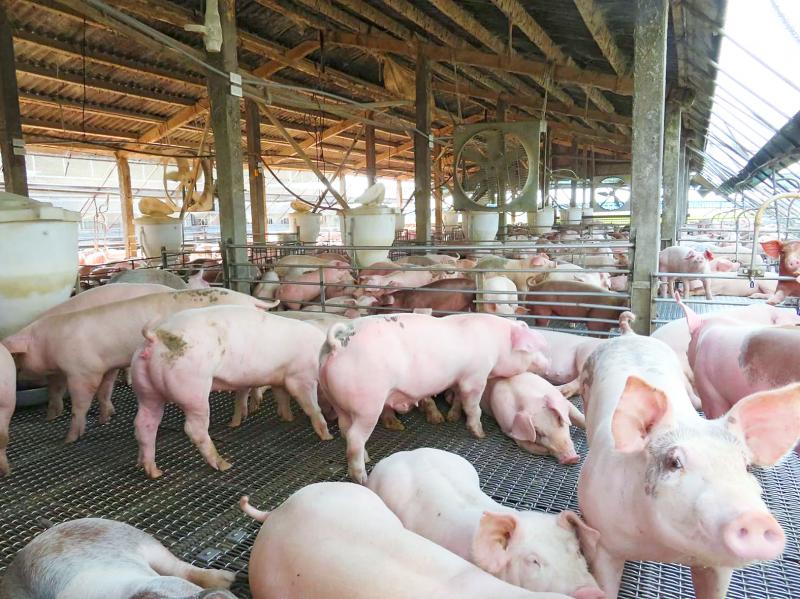The Paris-based World Organisation for Animal Health (OIE) on Tuesday officially declared Taiwan proper, Penghu and Matsu a foot-and-mouth disease (FMD)-free zone where vaccination is not practiced, the Council of Agriculture and President Tsai Ing-wen (蔡英文) announced on Facebook late on Tuesday night.
Kinmen was not included by the OIE as the county remains a FMD-free zone where vaccination is practiced.
The news, which had been expected, would facilitate the resumption of fresh pork exports after a 24-year hiatus.

Photo courtesy of Chiayi County Government
“Beginning now, Taiwan can finally resume pork exports and Taiwan’s pork can finally regain its place on the world stage,” Tsai wrote.
The council would not relax its guard as it works to prevent the spread of FMD and African swine fever in the nation, council Minister Chen Chi-chung (陳吉仲) wrote.
Chen added that the government hopes exports of fresh pork products could resume later this year.
He had previously said that Singapore was expected to be the first market.
The council said the nation’s pig farming industry had export sales of NT$60 billion (US$2.02 billion at the current exchange rate) in 1996, but was hit hard by an FMD outbreak in March 1997, which triggered the ban on exports of fresh pork products.
Prior to that outbreak, the nation had been free of the disease for more than 68 years
A few months after the outbreak, Taiwan began widespread FMD vaccinations and in 2003, it gained the status of an FMD-free nation where vaccination is practiced.
The government tried to end the vaccination program in 2009 in a bid to qualify for non-vaccination status, but the effort failed after seven FMD cases were reported that year.
Taiwan proper, Penghu and Matsu saw their last FMD case in 2013 and regained FMD-free status with vaccination in August 2017, while an outbreak in Kinmen occurred in 2015, resulting in the county only regaining its status in May 2018.
The government began a program on July 1, 2018, to eliminate the need for FMD inoculation everywhere but Kinmen, and in July last year it applied to the OIE for FMD-free status.
Foot-and-mouth disease is a highly contagious viral disease that affects cattle, swine, sheep, goats and other cloven-hoofed ruminants.
A total of 5.51 million pigs are being raised nationwide and pig farming last year was valued at NT$70.9 billion, council data showed.

INVESTIGATION: The case is the latest instance of a DPP figure being implicated in an espionage network accused of allegedly leaking information to Chinese intelligence Democratic Progressive Party (DPP) member Ho Jen-chieh (何仁傑) was detained and held incommunicado yesterday on suspicion of spying for China during his tenure as assistant to then-minister of foreign affairs Joseph Wu (吳釗燮). The Taipei District Prosecutors’ Office said Ho was implicated during its investigation into alleged spying activities by former Presidential Office consultant Wu Shang-yu (吳尚雨). Prosecutors said there is reason to believe Ho breached the National Security Act (國家安全法) by leaking classified Ministry of Foreign Affairs information to Chinese intelligence. Following interrogation, prosecutors petitioned the Taipei District Court to detain Ho, citing concerns over potential collusion or tampering of evidence. The

‘FORM OF PROTEST’: The German Institute Taipei said it was ‘shocked’ to see Nazi symbolism used in connection with political aims as it condemned the incident Sung Chien-liang (宋建樑), who led efforts to recall Democratic Progressive Party (DPP) Legislator Lee Kun-cheng (李坤城), was released on bail of NT$80,000 yesterday amid an outcry over a Nazi armband he wore to questioning the night before. Sung arrived at the New Taipei City District Prosecutors’ Office for questioning in a recall petition forgery case on Tuesday night wearing a red armband bearing a swastika, carrying a copy of Adolf Hitler’s Mein Kampf and giving a Nazi salute. Sung left the building at 1:15am without the armband and apparently covering the book with a coat. This is a serious international scandal and Chinese

Seventy percent of middle and elementary schools now conduct English classes entirely in English, the Ministry of Education said, as it encourages schools nationwide to adopt this practice Minister of Education (MOE) Cheng Ying-yao (鄭英耀) is scheduled to present a report on the government’s bilingual education policy to the Legislative Yuan’s Education and Culture Committee today. The report would outline strategies aimed at expanding access to education, reducing regional disparities and improving talent cultivation. Implementation of bilingual education policies has varied across local governments, occasionally drawing public criticism. For example, some schools have required teachers of non-English subjects to pass English proficiency

TRADE: The premier pledged safeguards on ‘Made in Taiwan’ labeling, anti-dumping measures and stricter export controls to strengthen its position in trade talks Products labeled “made in Taiwan” must be genuinely made in Taiwan, Premier Cho Jung-tai (卓榮泰) said yesterday, vowing to enforce strict safeguards against “origin laundering” and initiate anti-dumping investigations to prevent China dumping its products in Taiwan. Cho made the remarks in a discussion session with representatives from industries in Kaohsiung. In response to the US government’s recent announcement of “reciprocal” tariffs on its trading partners, President William Lai (賴清德) and Cho last week began a series of consultations with industry leaders nationwide to gather feedback and address concerns. Taiwanese and US officials held a videoconference on Friday evening to discuss the